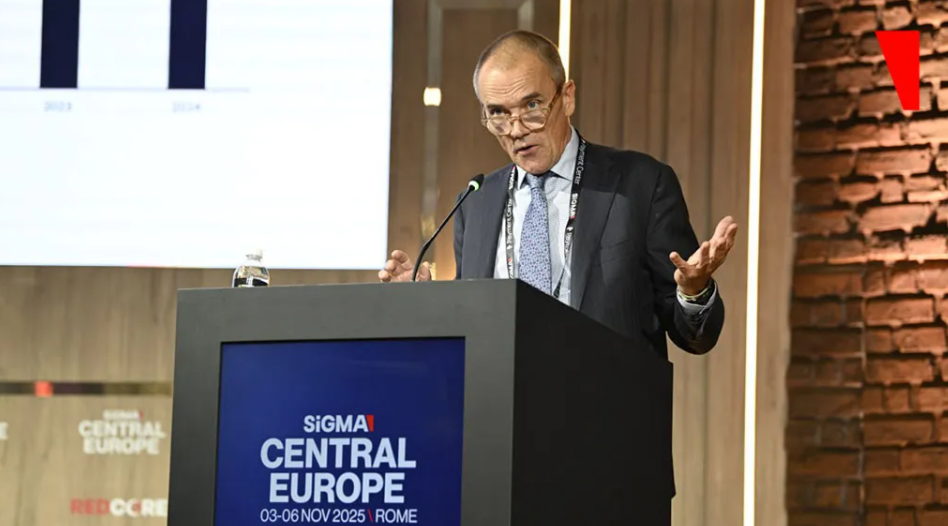
Keynote by Anders Dorph, Director of the Danish Gambling Authority and Chair of the Gambling Regulators Forum, delivered at SiGMA Central Europe
At the SiGMA Central Europe summit, Anders Dorph, one of Europe’s leading regulators and Director of the Danish Gambling Authority, offered a frank and data-driven keynote on the Regulatory Outlook for Europe’s Gambling Market: Expectations, Priorities and Challenges. Speaking both as a national regulator and as Chair of the Gambling Regulators Forum, Dorph painted a picture of a market under pressure but guided by pragmatism and close industry dialogue.
Denmark’s regulatory model, Dorph explained, has long been characterised by open dialogue between regulators and operators. “We have a very close dialogue with industry – Denmark is well known for this approach,” he noted. This collaborative spirit has helped avoid fines, reduced compliance risks, and maintained a healthy balance between industry growth and responsible play.
Turning to land-based gambling, Dorph was candid about the challenges facing Denmark’s slot machine sector. “The market is facing problems,” he said, pointing to an aging player base and a lack of investment in modernisation. Older generations of players are dissapearing and we’re not recruiting new players.” He contrasted the Danish approach with that of the UK, where operators have invested in newer, more engaging machines that offer players a better experience.
Dorph highlighted the increasingly tense political environment around gambling in Denmark. A 2021 survey using the PGSI method indicated an overall rise in problem gambling, particularly among those with milder forms of gambling harm. Of Denmark’s roughly six million citizens, about 15,000 are estimated to experience gambling problems, triple the previously reported figure.
Perhaps most striking was the revelation that younger Danes now show the same level of gambling issues as older generations – a finding that Dorph described as “an eye-opener.” Although political action was slow to follow, a new agreement was finally reached just two weeks before his speech. The measures include a ban on whistle-to-whistle gambling ads during matches, restrictions on marketing within 200 metres of schools (which effectively limits advertising in 35% of the country), and prohibitions on ads in public transport.
Despite frequent political claims that gambling is “exploding,” Dorph countered that the data tell a different story. “In Denmark, gambling has been falling, not exploding. It peaked seven years ago,” he said. While online casino play continues to grow, overall spending is declining. Still, these facts are “hard to sell” politically, as public frustration with gambling advertising runs deep — with 80% of Danes expressing fatigue over the volume of commercials.
In response to concerns about youth gambling, Denmark has rolled out a nationwide school program aimed at promoting understanding of gambling as entertainment, not a path to wealth. “In 2012 gambling was on a computer — now it’s on a mobile phone,” Dorph said. The program has shown measurable success: after participation, the share of students who said they gamble purely for entertainment rose from 70% to 80%.
Like much of Europe, Denmark’s gambling landscape is shifting online. “If online casino keeps growing, it will soon surpass the lottery,” Dorph predicted. Meanwhile, the land-based market continues to shrink, with the regulator forecasting a 3% annual decline in the coming years. Both the number of licence holders and physical venues are steadily decreasing.
To keep pace with social and technological developments, Denmark is moving toward a cashless gambling environment. “It’s important the market moves with the development of society,” said Dorph. The regulator aims to allow digital payments, such as credit cards, for slots and arcade play, improving transparency and anti–money laundering (AML) controls. “ The future is cashless,” he asserted.
To revitalise the land-based sector, Denmark is developing a new licensing structure and legislation that will allow arcades to diversify their offerings — from pool tables and virtual games to serving low-alcohol beverages. The goal, Dorph explained, is “to get life back into the industry.”
Finally, Dorph underscored ongoing efforts to measure and reduce illegal online gambling activity, including the monitoring of crypto use and affiliate web traffic. The results are encouraging: the share of illegal gambling traffic has dropped from 91% to 78% – a significant improvement and a sign that enforcement and awareness efforts are working.
In closing, Anders Dorph’s keynote highlighted the tightrope regulators must walk in today’s gambling landscape – balancing political pressure, social responsibility, and market innovation. Denmark’s data-driven, collaborative approach may well serve as a model for Europe as it faces its own complex regulatory challenges ahead.
#DenmarkGambling #EuropeanRegulation #AndersDorph #ResponsibleGaming #MarketTrends #AML #IllegalGambling